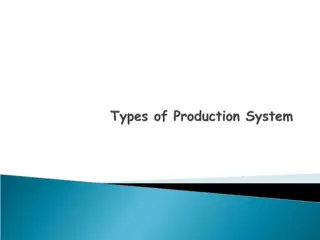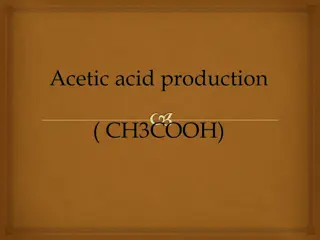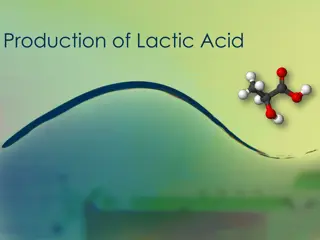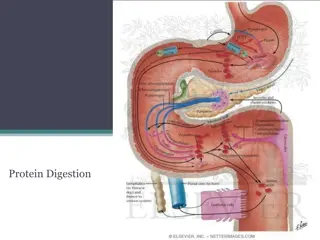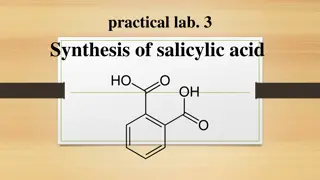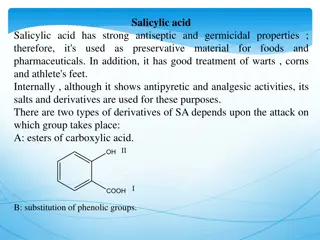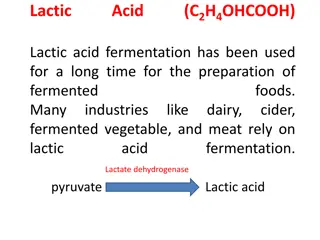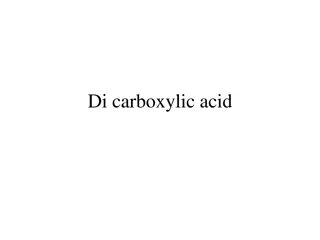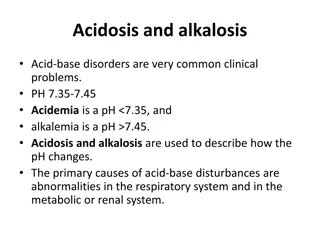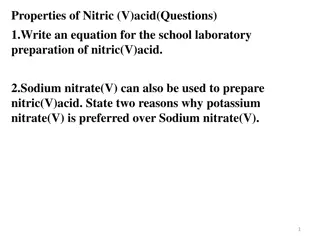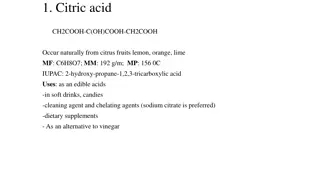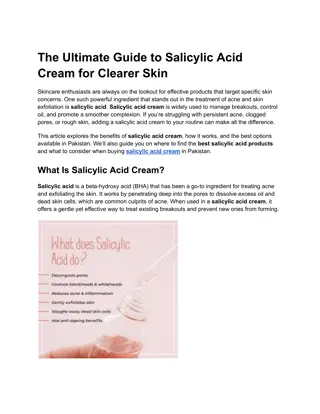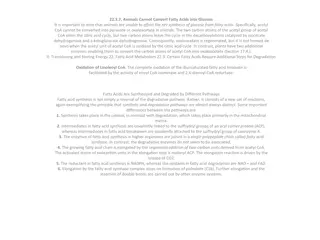Understanding the Production Function in Economics
The production function is a vital mathematical equation that determines the relationship between factors of production and the quantity of output. This function plays a crucial role in optimizing production efficiency by assisting in decision-making related to input levels, output quantities, and c
0 views • 9 slides
Best Acetic Acid Glacial Manufacturer Company - Modi Chemical
Modi Chemical stands out as the premier acetic acid glacial manufacturer, dedicated to delivering top-notch quality and unmatched customer service. With a strong focus on sustainability and innovation, Modi Chemical has become the go-to source for high-purity acetic acid glacial, catering to a wide
2 views • 1 slides
M-TOLUIC ACID Manufacturer in Gujarat - Modi Chemical
Modi Chemical is the top m-toluic acid manufacturer in Gujarat, renowned for delivering high-quality, pure m-toluic acid. Our state-of-the-art facilities and stringent quality control ensure exceptional product consistency and reliability. Committed to sustainability and innovation, we serve a wide
0 views • 1 slides
Understanding the Concept of Return to Factor in Production Economics
Return to Factor is a key concept in production economics that explains the relationship between variable inputs like labor and total production output. The concept is based on the three stages of production - increasing returns, diminishing returns, and negative returns. By analyzing the behavior o
0 views • 7 slides
Understanding Types of Production Systems: Intermittent vs. Continuous
Types of production systems are categorized into Intermittent Production System and Continuous Production System. In Intermittent Production, goods are produced based on customer orders in a flexible and non-continuous manner, allowing for a variety of products. Examples include goldsmiths making or
10 views • 17 slides
Industrial Production of Citric Acid and Microbial Fermentation
Industrial production of citric acid has evolved from extraction processes to microbial fermentation, offering various industrial applications. Citric acid is utilized as an acidulant in food and pharmaceutical industries, a chelating agent in tanning, and a flavor enhancer in carbonated beverages.
1 views • 18 slides
Determinants of Total Production in Macroeconomics
An economy's total production of goods and services (GDP) is influenced by the quantity of inputs, known as the Factors of Production, and the ability to transform inputs into output through the production function. The key factors of production are capital and labor, and the production function det
0 views • 37 slides
Industrial Production of Citric Acid: Fermentation Processes and Applications
Citric acid is industrially produced through microbial fermentation processes. It is widely used in various industries such as food, pharmaceuticals, and beverage production. Different methods like surface culture fermentation are employed for citric acid manufacture, with fungi like Aspergillus nig
4 views • 18 slides
Understanding Relations of Production in Society
People's need for survival drives them to engage in material production, forming the foundation of human existence. According to thinkers like Karl Marx, the interplay between economic production and social relationships shapes society's structure. The forces of production encompass technological ad
1 views • 7 slides
Overview of Livestock Production: Cattle, Sheep, and Goat Breeds
Explore the diverse world of livestock production, including cattle ranching, dairy farming, hog and pig farming, poultry and egg production, and animal aquaculture. Delve into the specifics of sheep and goat production, from breeds and production systems to management practices, breeding techniques
1 views • 43 slides
Understanding Television Commercial Production Process
Television commercials (TVCs) play a crucial role in advertising, promoting products, services, and ideas to a wide audience through television broadcast. This comprehensive guide covers the definition of TVCs, their objectives, steps in the production process (pre-production, production, post-produ
3 views • 34 slides
Limit Test of Iron Based on Color Reaction with Thioglycollic Acid
The limit test for iron involves the reaction of iron in ammoniacal solution with citric acid and thioglycollic acid to form a reddish-purple color. By comparing the color produced with a standard solution, the presence of iron is determined. Citric acid prevents precipitation of iron, while thiogly
1 views • 5 slides
Understanding the Impact of Acid Rain on Ecosystems
Investigate the effects of acid rain caused by fossil fuel combustion on water acidity, plant life, animals, and structures. Learn how nitrogen oxides and sulfur dioxide create acid solutions in the atmosphere, affecting watersheds and sensitive ecosystems. Explore the devastating consequences of ac
1 views • 20 slides
Determination of Acetic Acid Content in Vinegar Experiment
The experiment aims to measure the total acid concentration in a specific brand of vinegar through a titration process using NaOH solution. The procedure involves titrating the vinegar solution with NaOH until a pink color appears, calculating the concentration of acetic acid, and determining the pe
2 views • 8 slides
The Production and Uses of Acetic Acid: From Ancient Practices to Modern Applications
The production of acetic acid, specifically in the form of vinegar, has a long history dating back to ancient times. Vinegar was utilized for various purposes such as a food condiment, treating wounds, and addressing different illnesses. Today, acetic acid is mainly used in the food industry for con
1 views • 17 slides
Overview of Lactic Acid Production and Applications
Lactic acid occurs in two isomeric forms and has various applications in food, pharmaceuticals, and skincare industries. It is primarily produced through the fermentation of sugars by microorganisms. The production process involves using raw materials like purified sugars and agricultural wastes. Th
4 views • 11 slides
Understanding Enzyme Catalysis and Active Site Role
Enzymes play a crucial role in catalyzing biochemical reactions by stabilizing transition states through their active sites. Different mechanisms like acid-base, covalent, metal, and electrostatic interactions are employed for stabilization. Acid-base catalysis involves acceleration without being co
1 views • 21 slides
Understanding Protein Digestion and Amino Acid Metabolism
The process of protein digestion involves proteolytic enzymes produced by the stomach, pancreas, and small intestine. Pepsinogen is activated to pepsin in the stomach, breaking down proteins into oligopeptides and amino acids. After absorption, amino acids are utilized for protein synthesis and as d
0 views • 7 slides
Synthesis of Salicylic Acid: Theory, Derivatives, and Applications
Salicylic acid is synthesized from methyl salicylate through ester hydrolysis with aqueous alkali. It is a versatile compound used in organic synthesis, as a plant hormone, and derived from salicin metabolism. The derivatives of salicylic acid can minimize gastric disturbances and enhance therapeuti
4 views • 12 slides
Overview of Salicylic Acid and its Derivatives
Salicylic acid is known for its antiseptic, germicidal, and analgesic properties, used in various applications such as preservatives, wart treatments, and pain relief. Different derivatives of salicylic acid are developed to minimize side effects and enhance efficacy. Acetyl salicylic acid (ASA), co
0 views • 15 slides
Understanding the Role of Starter Culture in Fermented Milk Products
Starter cultures play a crucial role in the production of fermented milk products by producing antimicrobial compounds like organic acids, H2O2, CO2, aroma compounds, fatty acids, and bacteriocins. These compounds help prevent spoilage by inhibiting the growth of harmful bacteria and altering cellul
6 views • 9 slides
Understanding the Importance of Jigs and Fixtures in Production Techniques
Jigs, fixtures, and specialized tooling equipment play a crucial role in reducing production costs while maintaining accuracy and interchangeability of parts. They are essential in job production, batch production, flow production, and mass production. By ensuring accuracy, interchangeability, and e
2 views • 19 slides
Important Bacterial Groups in Food
Bacteria play a crucial role in food, with various groups such as Lactic Acid Bacteria, Acetic Acid Bacteria, Propionic Acid Bacteria, Butyric Acid Bacteria, Proteolytic Bacteria, Lipolytic Bacteria, Saccharolytic Bacteria, and Pectinolytic Bacteria identified for their specific roles in food fermen
0 views • 17 slides
Lactic Acid Fermentation in Food Industry
Lactic acid fermentation is a widely used method for producing fermented foods like dairy, vegetables, and meats. This process involves lactic acid bacteria and filamentous fungi to convert sugars into lactic acid. Various microbial cultures are utilized, and raw materials such as whey, molasses, an
0 views • 23 slides
Applications and Industrial Production of Fermentation in Various Sectors
Fermentation plays a crucial role in the production of organic solvents, food products, condiments, dairy products, processed meats, beverages, vitamins, and pharmaceutical compounds like antibiotics and vaccines. Specific examples include the production of citric acid, lactic acid, monosodium gluta
0 views • 6 slides
Production of Penicillin in Biochemistry and Biotechnology
Penicillin is an antibiotic produced from high-yielding strains of Penicillium chrysogenum. The production process involves maintaining the strains as spore suspensions, inoculation methods, composition of inoculum, production medium requirements, and use of precursors like phenyl acetic acid deriva
0 views • 22 slides
Understanding Purine Degradation and Gout
Purine degradation pathway involves the breakdown of dietary nucleic acids, mainly from meat, into uric acid through specific enzymatic steps. Excessive uric acid production can lead to conditions like gout and hyperuricemia. Humans excrete uric acid in the urine as the final product, while other an
1 views • 12 slides
Understanding Acid-Base Balance and Regulation in the Body
Acid-base balance is crucial for maintaining optimal physiological functions. This content explains the definitions of acids and bases, differentiates between strong and weak varieties, explores the significance of pH control in body fluids, and delves into the roles of buffers, kidneys, and lungs i
0 views • 20 slides
New Bakelite Production Phase 2: Salvatore Buontempo Presentation at CMS Central TC Group Meeting
Salvatore Buontempo presented on behalf of CMS Central TC Group at a meeting discussing Bakelite production facilities in Puricelli for CMS RE4 production. The presentation covered new production constraints, quality control measures, and details of the production facilities including a large craft
0 views • 11 slides
The Importance of Pre-Production in Television Program Production
The process of producing a television program is divided into three stages: Pre-Production, Production, and Post-Production. Pre-Production is vital as it involves setting goals, planning, and decision-making, which ultimately lead to smoother production and editing processes. Planning saves time, e
0 views • 17 slides
Understanding DiCarboxylic Acid: Properties, Preparation, and Uses
DiCarboxylic acid is an organic compound containing two carboxyl functional groups. Focus on Oxalic acid, its physical and chemical properties, preparation methods, and various applications including as a cleaning agent, in industrial processes, and potential medicinal uses. Learn about the unique c
0 views • 10 slides
Understanding Acidosis and Alkalosis in Acid-Base Disorders
Acid-base disorders, involving acidosis and alkalosis, are common in clinical practice. These conditions are characterized by changes in pH levels, with acidemia (pH < 7.35) and alkalemia (pH > 7.45) representing acidosis and alkalosis, respectively. The primary causes of these imbalances lie within
0 views • 17 slides
Laboratory Preparation of Nitric(V) Acid & Chemical Reactions
In this set of questions, we explore the preparation of nitric(V) acid in a school laboratory setting, its properties, and chemical reactions. Topics covered include the use of sodium nitrate(V) and potassium nitrate(V), the use of glass apparatus during the preparation process, color changes in con
0 views • 4 slides
Understanding Acid Rain and Its Environmental Impact
Exploring the phenomenon of acid rain, this activity investigates the effects of fossil fuel emissions on water acidity. By using a pH-meter sensor, participants create hypotheses and conduct experiments to understand what determines the pH of acid rain. Theoretical insights reveal how nitrogen oxid
1 views • 20 slides
Common Organic Acids and Their Uses in Various Industries
Citric acid, lactic acid, salicylic acid, and tartaric acid are natural acids found in various fruits. They have diverse applications in food and beverage, pharmaceutical, and cosmetic industries. These acids are used for flavoring, cleaning, as food additives, and in the preparation of various prod
0 views • 4 slides
Equilibrium and Acid-Base Problems in Chemistry Lecture
In this lecture, topics such as Advanced Equilibrium, Acid/Base Equilibria, Systematic Method for solving chemical problems, Strong Acid/Strong Base scenarios, and General Comments on reactions are discussed. Examples using the systematic method are provided for practical understanding. Key points o
0 views • 13 slides
The Ultimate Guide to Salicylic Acid Cream for Clearer Skin
This article explores the benefits of salicylic acid cream, how it works, and the best options available in Pakistan. We\u2019ll also guide you on where to find the best salicylic acid products and what to consider when buying salicylic acid cream in
0 views • 4 slides
Top 5 Salicylic Acid Body Washes for Clear Skin
Salicylic acid, a powerful beta hydroxy acid (BHA), is known for its remarkable ability to fight acne and improve skin texture. As an ingredient commonly found in skincare products, salicylic acid body washes are particularly effective for treating b
0 views • 4 slides
Understanding Serum Uric Acid Levels and Hyperuricemia
Serum uric acid is a crucial marker of purine metabolism, with elevated levels indicating hyperuricemia which can lead to conditions like Gout. The measurement of serum uric acid helps in diagnosing hyperuricemia, with serum being the preferred specimen for testing. Various factors such as diet, gen
0 views • 12 slides
Understanding Fatty Acid Metabolism in Animals
Animals cannot convert fatty acids into glucose due to the inability to synthesize glucose from fatty acids. The process involves acetyl-CoA not being converted into pyruvate or oxaloacetate, leading to the citric acid cycle and differences between fatty acid synthesis and degradation pathways. Key
0 views • 8 slides




